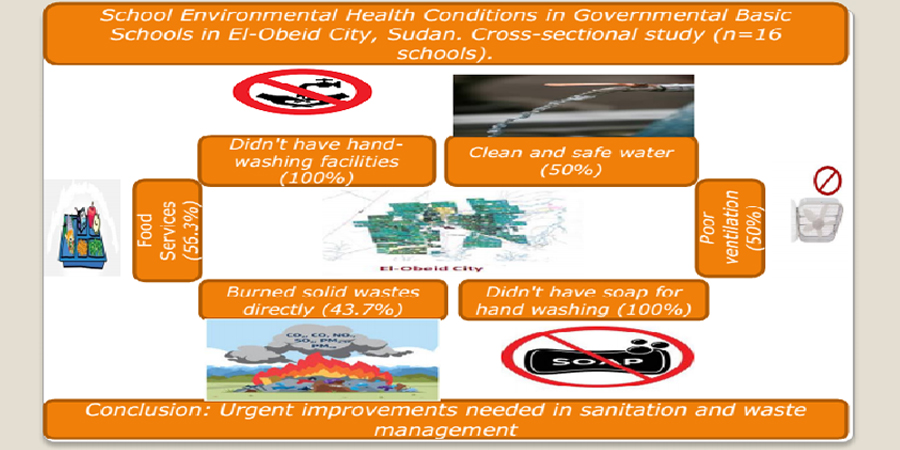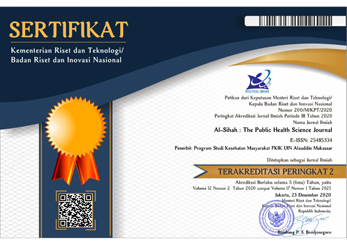Assessment of School Environmental Health Conditions in Governmental Primary Schools
A Cross-Sectional Study in El-Obeid City, North Kordofan State, Sudan
DOI:
https://doi.org/10.24252/al-sihah.v17i1.53874Keywords:
environmental health, hand disinfection, schools, sanitation, studentsAbstract
Ensuring environmental health in schools is vital for promoting student well-being and learning outcomes, particularly in under-resourced rural settings. However, evidence on environmental health conditions in Sudanese schools is limited. This study aimed to assess the school environmental health conditions in governmental primary schools in El-Obeid City, North Kordofan State, Sudan. Sixteen governmental basic schools were surveyed. A cluster random probability sampling technique was used to select schools. A structured checklist form was used for data collection. Data were managed and analyzed using descriptive statistics within a cross-sectional framework. Final results were presented and interpreted in tables.The results showed that 93% of schools were located at a suitable distance from public services, pollution, and noise. All school buildings were deemed acceptable. Fifty percent of schools had poor ventilation. Fifty percent of schools had access to reliable sources of clean and safe water. Latrines were available in 75% of schools. None of the schools had hand-washing facilities or soap for hand washing. Approximately 43.7% of schools burned solid waste directly. About 56.3% of schools had a canteen or cafeteria. There was a complete absence of hand-washing facilities in all schools and a lack of solid waste disposal services provided by local authorities. Urgent improvements are needed in sanitation and waste management.
Downloads
References
Abdalhai, K., Mokitimi, S., & Vries, P. (2023). Child and adolescent mental health services in khartoum state, sudan: a desktop situational analysis.. https://doi.org/10.21203/rs.3.rs-3408520/v1
Abu-Fatima, O., Abbas, A., Racalbuto, V., Smith, L., & Pizzol, D. (2020). Child undernutrition in sudan: the social and economic impact and future perspectives. American Journal of Tropical Medicine and Hygiene. https://doi.org/10.4269/ajtmh.20-1251
Abulhassan, Y., & Davis, G. A. (2021). Considerations for the transportation of school aged children amid the Coronavirus pandemic. Transportation research interdisciplinary perspectives, 9, 100290. https://doi.org/10.1016/j.trip.2020.100290

Downloads
Published
How to Cite
Issue
Section
License
Copyright (c) 2025 Musa Adam Osman Mohammed Mohammed, Jibril Abdi Jimale Alim, Eyman Ahmed Abdrahum Koko

This work is licensed under a Creative Commons Attribution-NonCommercial-ShareAlike 4.0 International License.
Authors retain copyright and grant the journal right of first publication with the work simultaneously licensed under a Creative Commons Attribution-NonCommercial-ShareAlike 4.0 International License that allows others to share the work with an acknowledgment of the work's authorship and initial publication in this journal.
Authors are able to enter into separate, additional contractual arrangements for the non-exclusive distribution of the journal's published version of the work (e.g., post it to an institutional repository or publish it in a book), with an acknowledgment of its initial publication in this journal.
Authors are permitted to publish their work online in third parties as it can lead to wider dissemination of the work.













